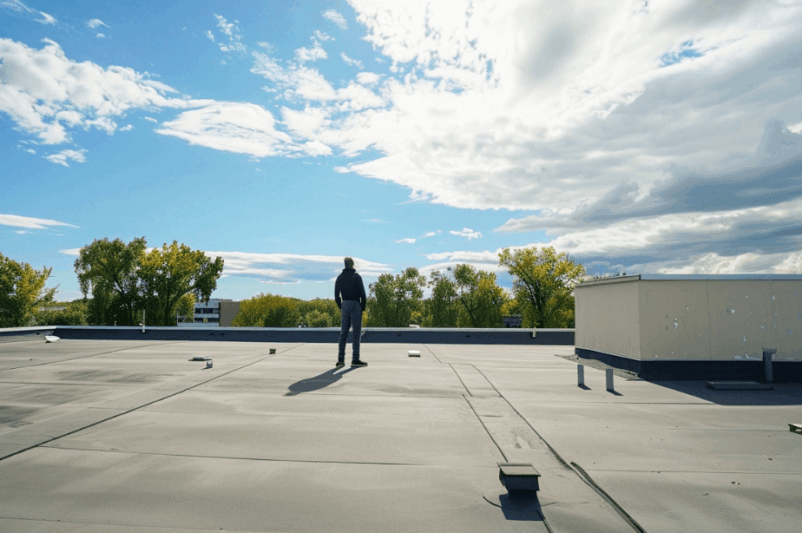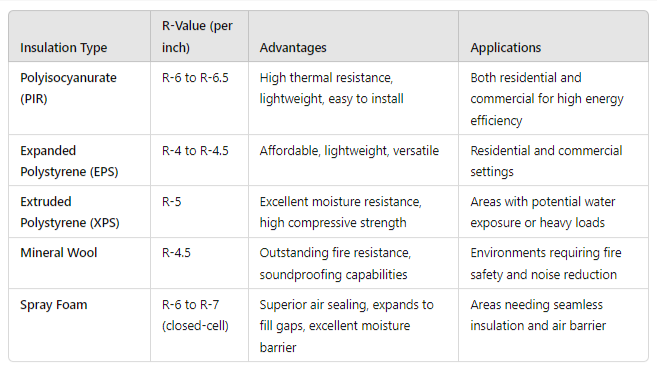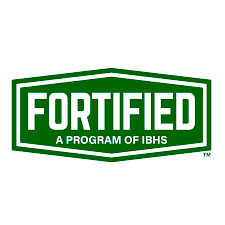
Flat roofs are a common architectural feature, particularly in modern and commercial buildings. Proper insulation is crucial for these roofs to ensure energy efficiency, comfort, and longevity. This guide will walk you through everything you need to know about flat roof insulation, from understanding the structure of flat roofs to selecting the best insulation materials.
Flat Roof Structures and Types
To appreciate the importance of insulation, let’s first dig into the types of flat roofs and their unique characteristics.
- Warm Flat Roofs: In a warm flat roof, the insulation is placed above the structural deck and below the weatherproof membrane. This setup keeps the entire structure warm, preventing thermal bridging and condensation. Warm roofs are favored for their efficiency and ease of installation.
- Cold Flat Roofs: On the other hand, cold flat roofs have insulation beneath the structural deck and above the ceiling of the top floor. This design can be less efficient as the deck is exposed to temperature fluctuations, which may lead to condensation issues if not properly ventilated.
The type of flat roof influences the performance and durability of the insulation used. For instance, in warm flat roofs, the insulation is directly exposed to the weatherproofing layer, requiring materials that can withstand external conditions.
Flat roof insulation is more than just an energy-saving measure. It offers multiple benefits that contribute to the overall functionality and comfort of your building.
- Energy Efficiency: Effective insulation significantly reduces heat loss in the winter and keeps the interior cool in the summer. This is arguably the biggest determining factor when looking at insulation options for flat roofs, as it leads to lower energy bills (which can be huge for a commercial building!).
- Improved Comfort: Similarly to that efficiency, well-installed insulation helps maintain consistent indoor temperatures, creating a more comfortable living or working environment. Imagine stepping into a room that’s perfectly cool on a scorching 100-degree summer day ?, thanks to well-installed insulation.
- Moisture Control: Insulation acts as a barrier against moisture, preventing issues like mold growth and structural damage. This is particularly important in flat roofs where water can pool and seep through weak spots.
- Noise Reduction: Insulation also serves as a sound barrier, reducing the transmission of external noise into the building. This can be especially beneficial in urban areas with high noise pollution.
Choosing the Right Insulation Material
Selecting the right insulation material for your flat roof can significantly impact its performance and durability. Here’s a closer look at the most popular options:
Polyisocyanurate (PIR) Insulation: Polyisocyanurate, known for its high thermal resistance, is a top choice for energy efficiency. With an R-value of R-6 to R-6.5 per inch, it’s lightweight and easy to install, making it a favorite in commercial settings. If energy savings are your top priority, PIR is an ideal choice.
Expanded Polystyrene (EPS) Insulation: EPS insulation is recognized for its affordability and good thermal properties. While its R-value ranges from R-4 to R-4.5 per inch, it is lightweight and versatile, suitable for various applications, from residential to commercial buildings.
Extruded Polystyrene (XPS) Insulation: Offering superior moisture resistance and durability, XPS is another excellent option. With an R-value of R-5 per inch and higher compressive strength compared to EPS, XPS is perfect for areas exposed to moisture or heavy loads, making it ideal for regions with high rainfall or buildings with rooftop gardens.
Mineral Wool Insulation: Mineral wool excels in fire resistance and soundproofing. Made from volcanic rock or steel mill slag, it provides excellent thermal properties and durability. With an R-value of R-4.5 per inch, mineral wool is best used in environments where fire safety and noise reduction are paramount.
Spray Foam Insulation: Spray foam insulation is a versatile option that provides superior air sealing properties. Available in open-cell and closed-cell forms, it can expand to fill gaps and cracks, offering a seamless barrier against air and moisture. Closed-cell spray foam, with an R-value typically between R-6 to R-7 per inch, is denser and offers higher thermal resistance.

Why Insulate Your Flat Roof?
Compliance. In many jurisdictions, building codes and standards require specific levels of insulation for flat roofs. Ensuring that your roof meets these standards not only helps in compliance but also maximizes the benefits of insulation, such as energy efficiency and structural protection. Staying compliant with these regulations can also avoid potential legal and financial penalties.
Increased Property Value. A well-insulated flat roof can increase the overall value of your property. Prospective buyers and tenants often look for properties that offer energy efficiency and lower utility costs. By investing in high-quality insulation, you make your property more attractive in the real estate market, potentially leading to a higher resale value or rental income.
Improved Moisture Management. Proper insulation can help manage moisture levels by preventing condensation and reducing the risk of mold growth. This is especially important for flat roofs, which are more susceptible to water pooling and leakage.
Protection Against Structural Damage. Insulating your flat roof can protect the structural integrity of your building. Insulation helps to prevent thermal stress, which occurs when the roof materials expand and contract due to temperature fluctuations. This can reduce the likelihood of cracks, leaks, and other damage, reducing the need for costly repairs.
There are many reasons to put resources towards proper insulation of your flat roof. If you have questions about your unique situation, give us a call at (210) 941-3437.





